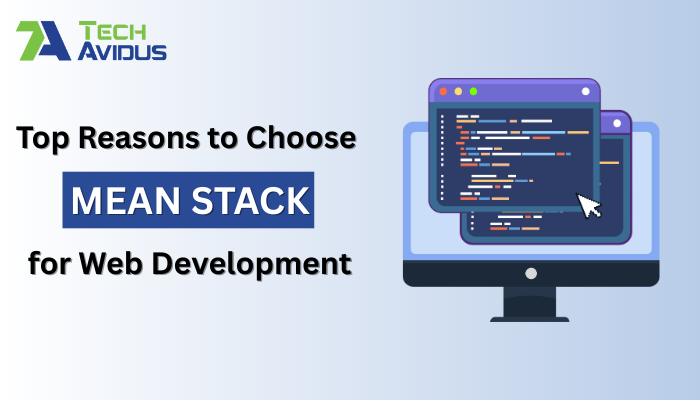
Are you looking to build a robust and modern web application? If so, you might have heard about the MEAN stack. This blog post will explore why MEAN stack is a fantastic choice for web development, especially if you want a streamlined and efficient development process.
MEAN stack is an acronym for MongoDB, Express.js, Angular, and Node.js. It's a full-stack JavaScript framework that allows developers to build dynamic and feature-rich web applications. Each component of the MEAN stack plays a crucial role in the development process:
Now that we have a basic understanding of the MEAN stack let's explore why you should choose it for your next web development project.
1. Single Language Throughout
One of the most significant advantages of the MEAN stack is that it allows developers to use JavaScript for both front-end and back-end development. This means you can have a cohesive development process without switching between different programming languages. Whether you're working on the server-side code with Node.js or building interactive user interfaces with Angular, you'll be using JavaScript, which leads to better consistency and efficiency in development.
2. Full Stack JavaScript Expertise
By choosing MEAN stack, developers can become proficient in full-stack JavaScript development. This expertise is precious in today's tech industry, as it allows developers to work on both the client and server sides of an application without needing to learn additional languages or frameworks. This streamlines the development process and enhances collaboration within development teams.
3. Scalability and Performance
MEAN stack is designed to be scalable and performant, making it suitable for building applications that handle many users and data. As a NoSQL database, MongoDB offers horizontal scalability and can easily handle massive amounts of data. Express.js and Node.js are known for their high performance, allowing applications built with MEAN stack to deliver fast and responsive user experiences.
4. Community Support and Documentation
Another significant advantage of choosing the MEAN stack is the strong community support and extensive documentation. Since all the components of the MEAN stack are open-source technologies, developers can access a wealth of resources, tutorials, and forums where they can seek help, share knowledge, and stay updated with the latest developments in the stack. This robust support ecosystem ensures that developers can overcome challenges and accelerate growth.
5. Code Reusability and Modularity
MEAN stack promotes code reusability and modularity, essential principles in modern software development. With Angular's component-based architecture, developers can create reusable UI components that can be easily integrated into different application parts. Additionally, Node.js's modular design allows developers to organize their server-side code into reusable modules, making the codebase more maintainable and scalable over time.
6. Real-time Web Applications
MEAN stack is well-suited for building real-time web applications, thanks to the capabilities of Node.js and the event-driven architecture it offers. With technologies like WebSockets, developers can create interactive features such as chat applications, live notifications, collaborative editing tools, and more, all of which enhance user engagement and interactivity.
7. Flexibility and Customization
Each component of the MEAN stack provides developers with a high degree of flexibility and customization options. Whether choosing different modules in Node.js, defining data models in MongoDB, or designing user interfaces in Angular, developers can tailor their applications according to specific requirements and preferences. This flexibility enables developers to create unique and innovative solutions that meet their users' needs.
8. Rapid Prototyping and Iteration
MEAN stack facilitates rapid prototyping and iteration, allowing developers to build and test new features or ideas quickly. With tools like Angular CLI for front-end scaffolding and Express.js middleware for server-side routing, developers can accelerate the development cycle and iterate on their applications faster. This agility is crucial in today's fast-paced development environment, where delivering value to users quickly is paramount.
9. Cost-Effective Development
Since the MEAN stack relies on open-source technologies, it can significantly reduce development costs compared to proprietary or licensed frameworks. Developers can leverage the rich ecosystem of open-source libraries, frameworks, and tools available for MEAN stack development without incurring additional licensing fees. This cost-effectiveness makes the MEAN stack attractive for startups, small businesses, and enterprises.
10. Seamless Deployment and Hosting
MEAN stack applications can be seamlessly deployed and hosted on various cloud platforms, including AWS, Azure, Google Cloud, and Heroku. Node.js's lightweight nature and Docker's containerization capabilities make it easy to package and deploy MEAN stack applications across different environments. Tools like PM2 for process management and Nginx for reverse proxying further enhance deployment and hosting capabilities.
In conclusion, MEAN stack offers many benefits that make it an excellent choice for web development projects of all sizes. From its single-language consistency and full-stack JavaScript expertise to its scalability, performance, and extensive community support, MEAN stack empowers developers to build robust, modern, and feature-rich web applications. Whether you're a seasoned developer or just starting your journey in web development, exploring the MEAN stack can open up new possibilities and accelerate your development efforts.
Our Top 1% Tech Talent integrates cutting-edge AI technologies to craft intelligent, scalable, and future-ready solutions.
All Rights Reserved. Copyright © 2025 | TechAvidus